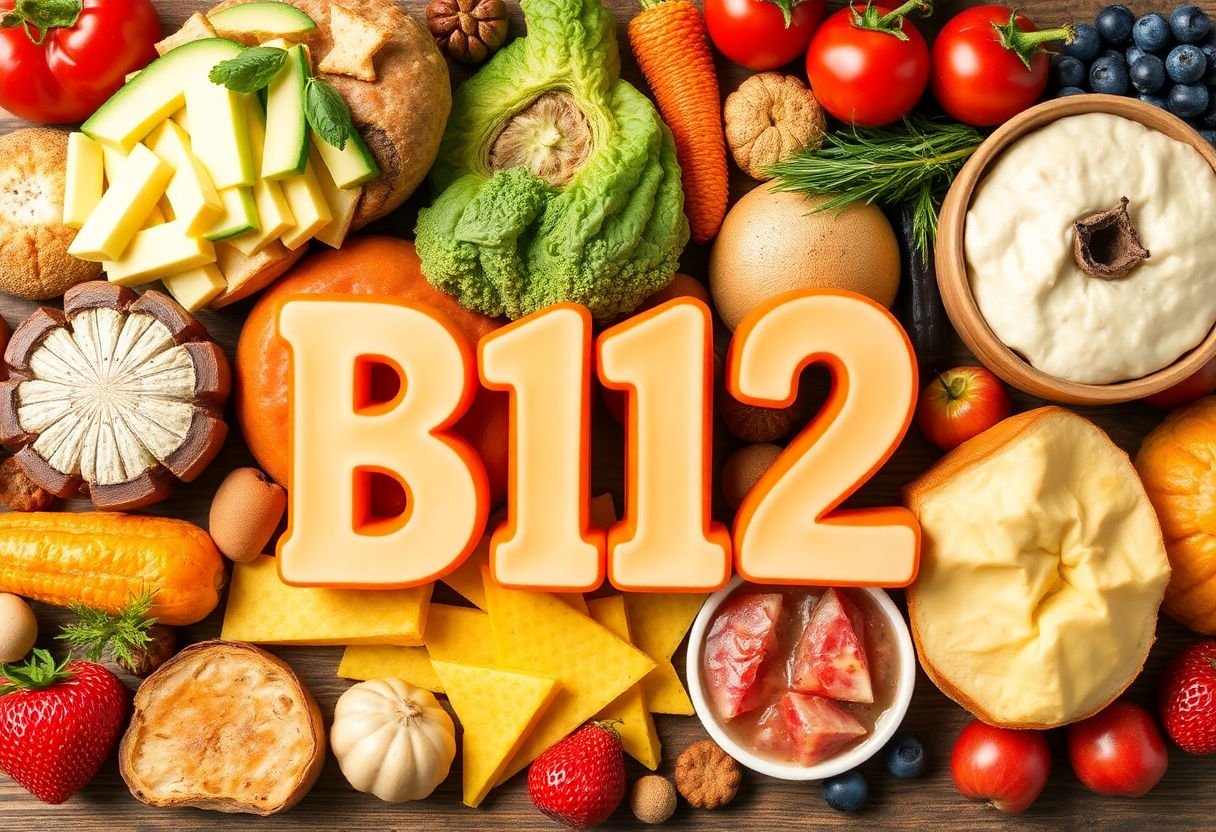Ensuring your child receives adequate Vitamin B12 is imperative for their growth, development, and overall health. This vital nutrient plays a crucial role in the formation of red blood cells and maintaining healthy neurological function. Understanding its importance, identifying rich sources, and recognizing the signs of deficiency can significantly impact your child’s well-being. This comprehensive guide will delve into the necessity of Vitamin B12 for children, explore dietary sources, recommend daily intakes, and discuss when supplements might be essential. Explore the critical takeaway points and safeguard your child’s health with expert insights into Vitamin B12 essentials.
Key Takeaways
- Vitamin B12 is crucial for children’s development, supporting brain function, and red blood cell formation.
- Rich dietary sources of Vitamin B12 include meat, dairy products, and fortified cereals that should be incorporated into a child’s diet.
- A deficiency in Vitamin B12 can lead to developmental delays, anemia, and fatigue, indicating the necessity for regular monitoring.
- Appropriate daily intake of Vitamin B12 is essential to avoid deficiencies, with specific guidelines tailored for various age groups.
- Overconsumption of Vitamin B12 is rare, but awareness and preventive measures can help safeguard a child’s health.
What is Vitamin B12?

Vitamin B12, also known as cobalamin, is an essential nutrient that plays a crucial role in many physiological processes within the human body. It is a water-soluble vitamin that is part of the B-vitamin family, which is key to maintaining the health of nerve and blood cells. This nutrient is of particular importance for children, as it aids in the production of DNA, the genetic material present in all cells, promoting healthy cell development and division.
One of the primary functions of Vitamin B12 is to help prevent megaloblastic anemia, a condition that can make children feel tired and weak. This form of anemia is characterized by the production of large, abnormal red blood cells due to impaired DNA synthesis, highlighting the importance of adequate Vitamin B12 for sustaining normal red blood cell formation.
Moreover, Vitamin B12 supports optimal brain development and function, which is vital during a child’s formative years. Its involvement in maintaining the health of the central nervous system ensures that cognitive functions such as thinking, learning, and memory are well-supported.
Another significant role of Vitamin B12 is its contribution to the synthesis of myelin, a protective layer that surrounds nerve fibers. This sheath is critical for efficient nerve transmission and overall neurological health, making Vitamin B12 indispensable for neurological maturation and protection against degenerative changes.
In summary, Vitamin B12 is a linchpin in a child’s nutritional framework, underpinning the development, energy levels, and neurological health necessary for growth and overall well-being.
Sources of Vitamin B12 for Children

To ensure children receive ample Vitamin B12, incorporating a diverse range of foods into their diet is essential. Here are some primary sources of this crucial nutrient:
-
Animal-Based Foods: The most abundant sources are found in animal products. Dairy products such as milk, cheese, and yogurt are excellent options, as they are readily absorbed and typically favored by children. Eggs also offer a good amount, particularly the yolks. Meats such as chicken, beef, and pork are rich in Vitamin B12, although these should be cooked properly to maintain nutritional benefits.
-
Fish and Seafood: Fish like salmon and tuna, as well as shellfish such as clams and crabs, are not only high in Vitamin B12 but also provide other essential nutrients. Incorporating fish into weekly meals can enhance both the flavor and the nutritional value of your child’s diet.
-
Fortified Foods: For families following vegetarian or vegan diets, fortified foods are invaluable. Many breakfast cereals, plant-based milk products, and nutritional yeasts are enriched with Vitamin B12 and can be great alternatives to animal-derived sources.
In managing dietary intake, consider the following as part of a balanced diet:
- Breakfast: Fortified cereals served with milk or fortified plant-based beverages.
- Lunch and Dinner: A variety of meats or fish, prepared appetizingly to suit children’s tastes.
- Snacks: Cheese sticks or boiled eggs can offer nutrient-rich snacking options.
By strategically integrating these nutrient-rich foods into daily meals, parents can significantly support their children’s growth and development, ensuring adequate Vitamin B12 intake.
Health Benefits of Vitamin B12 for Children
Vitamin B12 plays a pivotal role in supporting various physiological functions essential for children’s growth and development. One of the significant benefits of Vitamin B12 is its contribution to the development of a healthy nervous system. This vitamin is crucial for the formation of myelin, the protective covering that insulates nerve fibers and enhances the efficient transmission of electrical impulses. Consequently, adequate levels of Vitamin B12 can positively impact children’s cognitive functions, including memory and concentration, which are vital during the learning stages.
Furthermore, Vitamin B12 is instrumental in the production of red blood cells, which are necessary for oxygen transport throughout the body. By ensuring an ample supply of Vitamin B12, children can maintain optimal energy levels, reducing the risk of fatigue and supporting overall physical activity.
The vitamin also plays a role in DNA synthesis, ensuring proper cellular growth and repair. This function is crucial during childhood, a period marked by rapid growth and development.
In addition to these benefits, Vitamin B12 helps metabolize food into glucose, providing children with an essential energy source. This is particularly beneficial for active children who need sustained energy levels for daily activities and sports.
Vitamin B12 also contributes to maintaining a healthy immune system, which is essential for protecting children from infections and illnesses. Ensuring sufficient intake of this vitamin may enhance the child’s resilience to common colds and other minor infections.
By incorporating sources of Vitamin B12 into children’s diets, parents can support their offspring’s developmental milestones and overall health.
Identifying Vitamin B12 Deficiency in Children
Children’s overall health and development can be significantly impacted by a deficiency in Vitamin B12. Detecting this deficiency early is crucial to ensuring that a child receives the necessary nutrients for optimal growth. An understanding of the signs and symptoms can help parents and caregivers take proactive measures.
Common signs of Vitamin B12 deficiency in children include:
- Fatigue and Weakness: Reduced red blood cell production can lead to anemia, often resulting in persistent tiredness and lethargy.
- Pale or Jaundiced Skin: A lack of Vitamin B12 affects the formation of healthy red blood cells, causing skin pallor or a yellowish tint known as jaundice.
- Delayed Development: Cognitive and physical development delays may arise, including slower learning and difficulties in motor skill coordination.
- Behavioral Changes: Irritability, mood swings, and school performance issues can be indicative of a nutritional deficiency impacting the nervous system.
- Poor Appetite and Weight Loss: A reluctance to eat, resulting in unwanted weight loss, may signal insufficient Vitamin B12 levels.
If you observe these symptoms, seeking medical evaluation is advised. Blood tests can confirm Vitamin B12 deficiency, allowing for timely intervention. Addressing this condition early on can promote better health outcomes and support your child’s developmental needs. In some cases, dietary adjustments or supplements might be recommended to restore Vitamin B12 levels to an optimal range, contributing positively to energy, mood, and overall well-being.
Recommended Daily Intake for Vitamin B12
The recommended daily intake (RDI) for Vitamin B12 varies depending on age, ensuring children receive the essential nourishment necessary for their growth and development. According to health guidelines, infants up to 6 months should receive approximately 0.4 micrograms (mcg) of Vitamin B12 per day. From 7 to 12 months, the intake increases slightly to 0.5 mcg.
For children aged 1 to 3 years, the recommended daily intake is 0.9 mcg. As they grow older and their bodies require more of this vital nutrient, the RDI for children between 4 and 8 years rises to 1.2 mcg. During the critical pre-adolescent phase, from ages 9 to 13, it further increases to 1.8 mcg.
Adolescents aged 14 to 18 years should aim for 2.4 mcg per day, aligning with the adult RDI, as their bodily requirements become more similar to adults.
Including a sufficient amount of Vitamin B12 in a child’s diet supports their energy metabolism and neurological function. Parents should monitor the intake, especially in families practicing plant-based diets, where natural sources of this vitamin are less prevalent.
When dietary sources are unable to meet these requirements, a pediatric healthcare provider might suggest supplements. However, it is crucial to adhere strictly to the recommended dosages to prevent any possible adverse effects. Regularly consulting with medical professionals can ensure children receive the optimal amount of Vitamin B12 necessary for maintaining robust health and development.
Vitamin B12 Supplements for Kids

Vitamin B12 supplements provide an alternative means to ensure your child obtains the necessary amount of this critical nutrient, especially in cases where dietary sources may be insufficient. While most children receive adequate Vitamin B12 from a balanced diet that includes meat, dairy, and fortified cereals, certain situations, such as vegetarian or vegan diets, may require supplementation.
When considering Vitamin B12 supplements for children, it’s essential to choose products specifically designed for their age group. These supplements usually come in various forms, such as chewable tablets, gummies, or liquid drops, making them easy and appealing for children to consume. It is crucial to adhere to the recommended daily allowances for children, which varies by age:
- Infants (0-6 months): 0.4 micrograms
- Infants (7-12 months): 0.5 micrograms
- Children (1-3 years): 0.9 micrograms
- Children (4-8 years): 1.2 micrograms
- Adolescents (9-13 years): 1.8 micrograms
- Teens (14-18 years): 2.4 micrograms
Moderation is key, as Vitamin B12 is a water-soluble vitamin, meaning excess amounts are typically excreted through the urine, minimizing the risk of toxicity. However, excessive supplementation should be avoided unless a deficiency is diagnosed, as advised by a healthcare professional. Parents considering supplements should consult a pediatrician, particularly if their child presents symptoms of deficiency or if their dietary intake does not meet nutritional guidelines.
By integrating the right Vitamin B12 supplement into a child’s regimen, parents can fortify their child’s nutrition effectively, contributing to their overall health, energy levels, and cognitive development.
Safeguarding Against Overdose
Overconsumption of any nutrient can lead to health challenges, and Vitamin B12 is no exception. While it is water-soluble and typically has a low risk of toxicity, excessive intake can still pose potential concerns. It is crucial for parents to be aware of the risks associated with Vitamin B12 overdose to ensure their child’s safety and well-being.
One primary consideration is that an overdose, although rare, may occur when Vitamin B12 is consumed in exceptionally high doses through supplements rather than food sources. Potential signs of excessive Vitamin B12 include skin rashes, diarrhea, dizziness, or headaches. Parents should monitor their children for any unusual symptoms if supplementing with Vitamin B12.
To mitigate the risk of overdose, it’s advisable to adhere to the recommended dietary allowances (RDAs) for children. For instance, children between ages 4 and 8 require about 1.2 micrograms per day, while those aged 9 to 13 need 1.8 micrograms. Ensuring these levels are met through a balanced diet is optimal, as it naturally regulates Vitamin B12 intake without exceeding safe levels.
When considering supplements, consult a healthcare professional to determine the appropriate dosage based on your child’s unique health needs. Supplements should only be used to fill nutritional gaps and not as a primary source of the vitamin.
Regular monitoring of Vitamin B12 levels, especially if your child has specific health conditions that affect nutrient absorption, can help in preventing both deficiency and overdose, thus maintaining their overall health and vitality.
Conclusion
Integrating Vitamin B12 into your child’s diet is crucial for promoting their healthy development and overall well-being. As highlighted, this vitamin plays an integral role in supporting neurological function and the production of red blood cells. Ensuring an adequate intake through diet or supplements can fend off deficiencies that may hinder growth and cognitive development. Looking towards the future, fostering a balanced diet rich in Vitamin B12 can pave the way for long-term health benefits. By prioritizing these nutritional needs today, you are investing in your child’s vibrant and healthy future. Remember, healthful habits start early.
Frequently Asked Questions
What are the primary benefits of Vitamin B12 for children?
Vitamin B12 is crucial for children’s growth as it supports red blood cell formation, nerve function, and DNA synthesis. Adequate levels help prevent anemia and contribute to overall energy levels and cognitive development.
How can I ensure my child gets enough Vitamin B12?
Incorporate foods like meat, fish, dairy products, and fortified cereals into their diet to naturally boost Vitamin B12 intake. Consider a pediatric supplement if dietary sources are insufficient, but consult your pediatrician first.
Can a vegetarian or vegan diet provide enough Vitamin B12 for children?
While plant-based diets may lack natural sources of Vitamin B12, fortified foods and supplements are viable alternatives to meet your child’s nutritional needs. Regular monitoring of B12 levels by a healthcare professional is advisable.
What are the symptoms of Vitamin B12 deficiency in children?
Symptoms can include fatigue, weakness, mood changes, and developmental delays. If you notice these signs, it is essential to consult a healthcare provider for appropriate testing and guidance.
Is it possible for children to consume too much Vitamin B12?
Although Vitamin B12 has a low risk of toxicity, excessive supplementation should be avoided without healthcare supervision. Always adhere to recommended dosages to prevent potential adverse effects.


